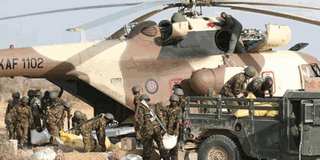Pulling troops out of Somalia would be an act of wisdom

A Kenya Defence Force helicopter delivers resupply and relief food at Tabda in the Central Sector during the Operation Linda Nchi in Somalia on February 21, 2012. Pulling troops out of harm’s way in Somalia would be an act of wisdom, not cowardice. PHOTO | JARED NYATAYA | NATION MEDIA GROUP
What you need to know:
- The temptation after a major attack such as the Shabaab mounted against Kenyan troops in southern Somalia is to escalate the war and exact revenge.
- But deepening Kenya’s involvement in a war which we must admit has turned into a mess and a quagmire will be a mistake.
- Kenya has been drawn into a clan war, being viewed as the enforcement wing of the Ogaden clan.
The temptation after a major attack such as the Shabaab mounted against Kenyan troops in southern Somalia is to escalate the war and exact revenge.
There is nothing wrong with those instincts. Going in “hot pursuit” of militants after such a savage attack is perfectly justified.
But deepening Kenya’s involvement in a war which we must admit has turned into a mess and a quagmire will be a mistake.
All the major troop contributing countries in Amisom have a strategic reason why they are in Somalia.
As a rebel commander who fought his way into office, the military is President Yoweri Museveni’s most important constituency.
For some time, especially since the insurgency in northern Uganda waned, Museveni was under pressure to reduce the size of the army and spend less on the military.
The Somalia engagement was a perfect way to keep the military happy.
The troops are paid handsomely by the United Nations and others and they are kept busy in Mogadishu, where they have dug themselves into a reasonably secure encampment around the presidential palace. Those Ugandan troops will be there for a long time.
The Ethiopians have historically regarded Somalia as a strategic foe, have fought wars with it and meddle constantly inside Somalia (and Kenya) partly because of ethnic politics back in Ethiopia.
The Ogadenis, who are one of the dominant clans in southern Somalia, are a major ethnic group in Ethiopia and, through the Ogaden National Liberation Front, they have fought a separatist war in Ethiopia for years.
CREATING BUFFER ZONE
That partly explains why the Ethiopians take such a keen interest in the clan politics in southern Somalia and have insisted on having a presence there.
What are the Kenyans doing in Somalia? The objective of creating a buffer zone has failed.
Instead, Kenya has been drawn into a clan war, being viewed as the enforcement wing of the Ogaden clan. Other clans in the region, especially the Marehan, bitterly resent the presence of Kenyan troops there.
It is little wonder that the El-Adde camp which was attacked was in the Marehan heartland and locals seem to have been warned to flee hours before the attack.
Meanwhile, the African Union Mission in Somalia (Amisom) is under-equipped and dysfunctional with no airforce, no aerial surveillance capability and no helicopter gunships. What is the endgame? Kenya’s leaders say they want to help Somalia “to build a stable country”.
How realistic is this goal? Isn’t that a task better left to the Somali people? Isn’t it wiser to build the strongest defences possible and leave the task in Somalia to others? History offers numerous examples of political leaders who have reacted to provocative attacks by escalating military involvement with disastrous consequences.
Perhaps the most famous example was the attack on an American military base in Vietnam in the early hours of February 7, 1965, near Pleiku.
DESTROYED MILITARY EQUIPMENT
The attackers destroyed military equipment and killed eight American soldiers and wounded 126. President Lyndon Johnson reacted by launching one of the most dramatic troop buildups in history, taking troop levels up more than 20 times the number who were in Vietnam during the attack.
The strategy, of course, failed and America lost the war. President Uhuru Kenyatta did not launch this war. That gives him political cover to end it.
Nobody is calling for a hasty, disorderly withdrawal. But an indefinite deployment makes no sense. Kenyans can play their role, with the international community, in training local troops and scouting for other countries that can hold key positions in southern Somalia when they leave.
At the same time, efforts should be invested in fast-tracking the border wall which is widely misunderstood but in its proposed format as the creation of a series of manned and policed border entry points with the rest of the border under keen surveillance, is a necessary investment.
Fighting the Shabaab in a determined fashion within the borders is a smarter strategy.




